Photography and open education
- Published
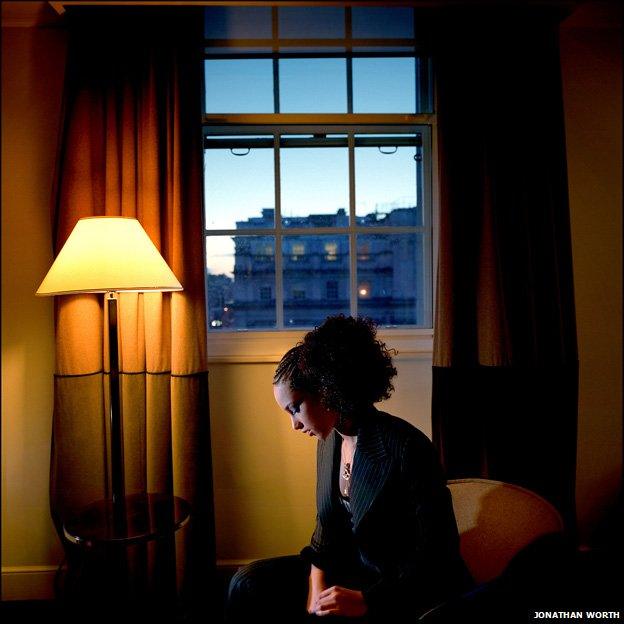
Alicia Keys by Jonathan Worth
Photographic tuition usually falls in to two camps, the hands-on, throw yourself at it kind, and the more contemplative course where class-based tuition is key.
Yet there is another way - open learning, where the majority of the students interact online with the face-to-face course being taught in a more traditional manner. With this comes a chance to share in the knowledge being offered by a wide range of tutors, photographers and others in the industry.
One such course at Coventry University is #phonar (photography and narrative), external. Run by Jonathan Worth, external and Matt Johnston, external, it can attract as many as 35,000 students as it progresses.
Every Wednesday morning in a room at the back of an old cinema, people gather to discuss what a 21st Century photographer is. Most aren't actually in the room, they join instead via the internet. But people do make the journey regularly from London, with others from as far and wide as San Francisco, Portland in Oregon, and even Otago in New Zealand.
"We have four hours a week and we have to stop teaching by 1pm or we get into trouble," says Worth. "But it is something that we feel very passionately about and so the project is something we throw all our spare time into. It has that back-bedroom feel about it, but it's turned out to be a strength not a weakness."
Worth has been a professional photographer since 1998, having lived and worked both in New York and London and currently works part-time for Coventry University heading up their Open Programme. "I was a successful editorial photographer, but like many I had a failing business model," he says. When asked to write some classes, he agreed so long as it wrestled with the problems crippling his business.
"I'd had to rethink what my product was as a photographer - I'd grown up thinking it was my images, but digital cameras meant everyone was a potential image maker. So I had to think why it was that I'd been successful in the past and I found a number of strands which proved very fruitful. That's the stuff we talk about in class."
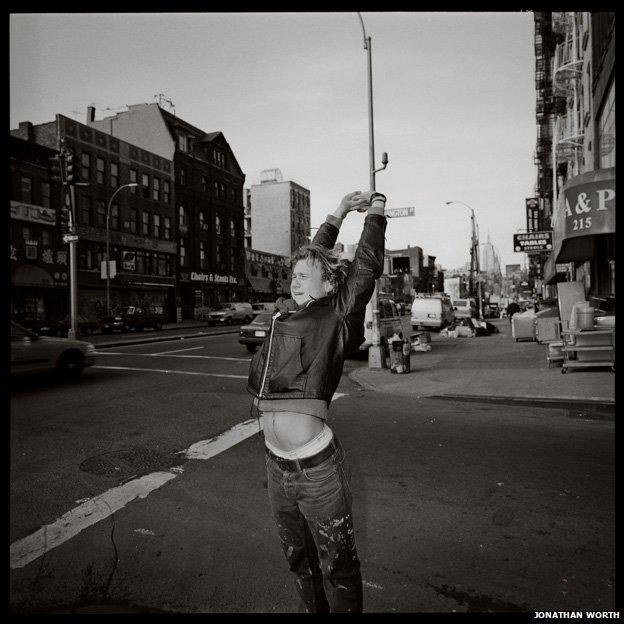
Heath Ledger - Worth's best shots came from walking between locations, rather than posing for the camera
Having not told the university that he'd given his first class away for free online, Worth was prepared for the worst. But it turned out to be just what Coventry University was looking for.
"The VC came to us and asked how we were going to raise the course profile, improve the experience for the students, grow their international opportunities and save money. Well, I was able to show how we'd been very successful attracting large numbers to #phonar and that we've had people go on to assist Annie Leibovitz, Trent Park, Steve Pyke, Elinor Carucci. It's now the hardest course in the uni to get onto, and by using existing social media environments it all came at no extra cost."
He uses Creative Commons licenses (CC) for his classes. "I'd always been an avid All Rights Reserved user but it just stopped making sense. The open classes can only work with a CC license, which was a big deal for the university because it turns out education establishment are avid All Rights Reserved users too. Much like me thinking I was just an image maker, the uni thought its product was 'knowledge' and their old business model relied on keeping a tight grip on that.
"Well, I knew it wasn't my product as a teacher. My product is the learning experience and opening the doors online meant that I turned that product into an outward-facing asset.
"In a world where everyone with a smartphone is a potential supplier of image content, I had to work out what I did that was different, and it turns out there's a whole bunch of stuff both as an artisan and as a mediator and publisher.
"On a personal level I also found out that this stuff has applications in other areas too - education being a case in point, where I realised the real thing of value was not the knowledge but the learning experience. The message of that experience is amplified by opening it up - hence the success of the open classes."
Worth's classes live on blogs and on Twitter (hashtag #phonar), and are proving a popular resource amongst photography enthusiasts and professionals alike. Their accessible nature is appealing and the list of contributors impressive. What's more you can book one-on-ones with guest tutors such as photographer Chris Floyd, artist Robbie Cooper and author Timothy O'Grady.
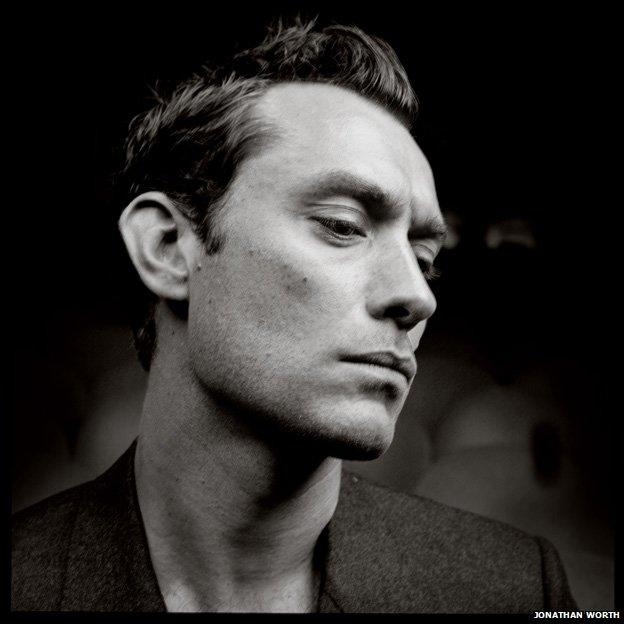
Jude Law
The open approach to education is something that can only grow as online learning becomes widely accepted.
Anyone who throws themselves in will be well-rewarded as the interactive side of the class is key. Worth can see comments from students both in the room and online via Twitter or Facebook in real time, as well as allowing others to drop in, or suggest links to relevant material. It's a fluid learning experience, well suited to those who will be working in an industry that, like many others, is undergoing radical change.
Here, two students who found it suited to their needs share their thoughts on the open learning experience:
Larissa Grace
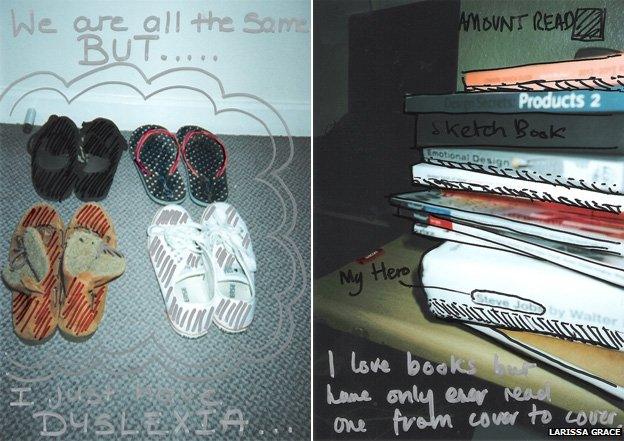
My time on the photography course made me see my world and understand the way I learn, and perhaps how much of the population learns. It also taught me to believe in myself. I am dyslexic, and through my time in education it has been a battle. At Coventry University they helped me understand that dyslexia can be a positive attribute in this multimedia world that is being created by us around us.
I learnt that reading and writing weren't the only way to communicate and that visual language, audio and limited writing can for many people be an even better way of communicating. They taught me how to use images, sounds and video to tell a story.
I might not be able to write a sentence or even read it, but I can communicate powerfully through the visual language. I have used sound, images and videos to document issues of personal interest to me and to help others understand better. My most recent work was to publish a piece of work that gave voice to students in education with dyslexia.
Through my work with #phonar I have learnt the world is filled with lots of different people and we all think and learn differently. Coventry University has shown me it doesn't matter what disability you have, anything is possible. I truly believe if it was not for the great staff I wouldn't be standing here today with a degree, they believed in me. I will carry on my storytelling work on issues that are important to me and hopefully make them proud.
You can see Larissa Grace's work on her website, external.
Sean Carroll
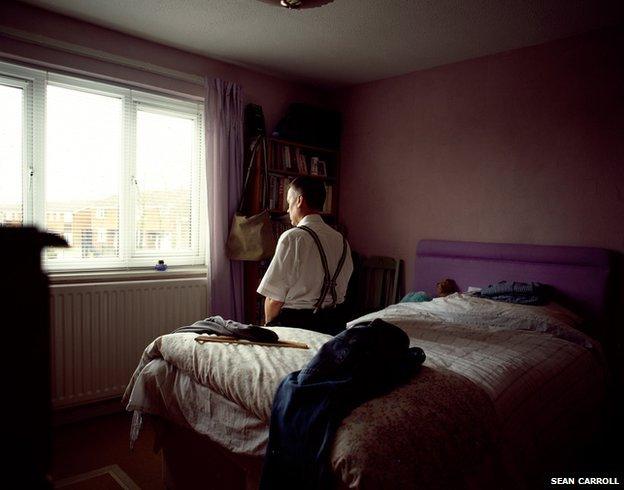
A frame from Sean Carroll's series on his father's possible return to work due to the Welfare Reform Bill
The photography course at Coventry University and especially the open classes have totally changed how I operate as a photographer. It's made me think about how I define myself as a 21st Century practitioner and helped me understand the importance of networking in order to find or tell a story.
It's opened up my eyes to the quantity of online platforms which can benefit me professionally, and has really kept me reflecting on myself in the role of author and storyteller.
As well as focusing on such online and digital tools, it has also promoted to me the idea of the importance of the physical artefact, something which has made a big impact on me and what I produce.
The skills I have learned and developed from the open classes have given me the confidence in my work to distribute it and enter it into national and international competitions. From this I won an honourable mention in the non-professional photo essay and feature story category of the International Photography Awards and was also was selected to exhibit at the recent Brighton Photo Fringe.
From this came coverage by other photo platforms like Foto8 which ran my work as a feature story in October, external.
You can see Sean Carroll's work on his website, external and keep up to date with his ongoing series Does not suggest that death within 6 months is likely to occur, external on his blog.
You can learn more about #phonar on the course website, external or via Twitter, external.